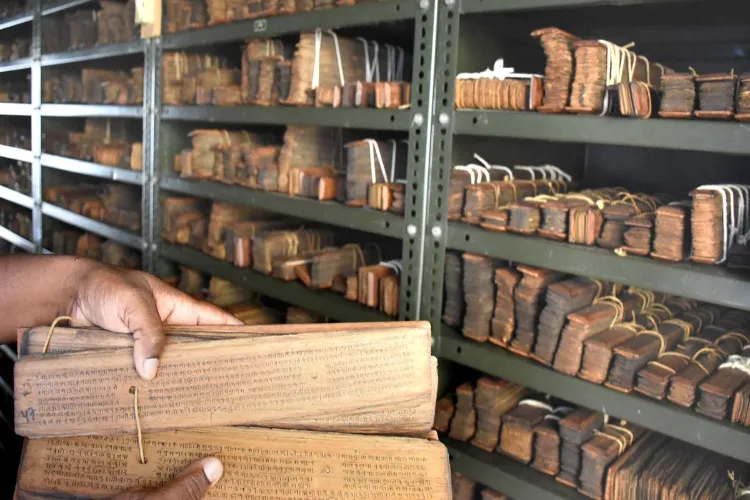
New Delhi
Asserting that manuscripts need to be recognised as "strategic instruments of soft power" within India's cultural diplomacy, an expert working group under the Gyan Bharatam Mission has recommended establishing a "dedicated national programme" that can integrate manuscripts into bilateral and multilateral cultural agreements.
Its other recommendations include engaging in dialogue with countries and institutions -- "repatriation diplomacy" -- "to bring home manuscripts of Indian origin, treating them as cultural treasures and shared heritage"; declaring and promoting a global 'India Manuscript Day'; and collaborating with academic institutions and repositories and establishing international "manuscript chairs".
Eight working groups, under different verticals, have been set up under the ambitious mission, and they presented some of their recommendations during the just-held Gyan Bharatam global conference in Delhi, in the presence of Prime Minister Narendra Modi.
The theme for Working Group No. 7 is 'Manuscripts as Tools of Cultural Diplomacy' and its members include scholars and experts from the Ministry of Culture, ICCR, IIT-BHU, Madras University and Delhi University, among others.
"Manuscripts need to be recognised as strategic instruments of soft power within India's cultural diplomacy framework. Currently, manuscript-related initiatives remain fragmented, i.e., they are limited to occasional exhibitions, academic conferences, or individual collaborations," reads the report by this working group.
"To unlock their full potential, a dedicated national programme should be established under the Ministry of External Affairs in partnership with the Ministry of Culture, the ICCR, and the National Mission for Manuscripts," it says.
The Indian Council for Cultural Relations (ICCR) is the cultural wing of the MEA.
The group has suggested that such a programme can "integrate manuscripts into bilateral and multilateral cultural agreements, establish manuscript exchange fellowships for scholars and conservators, create cultural centres abroad that display manuscripts as symbols of India's knowledge tradition, and leverage digitisation projects for global visibility while safeguarding fragile originals".
And this institutionalisation "ensures continuity, coordination, and a clear roadmap, transforming manuscripts from passive heritage into active agents of international engagement".
The working group has also suggested that collaborations with the British Library, the Library of Congress in the US, and Asian manuscript repositories can "make India's collections accessible worldwide".
Many invaluable manuscripts "lie scattered in foreign archives, private collections, and institutions", it said, adding, "advancing their repatriation through cultural diplomacy, international cooperation, and legal frameworks strengthens India's role as a responsible custodian of civilisational wisdom".
The group has further suggested strengthening of "national and international legal mechanisms to prevent illicit trade, smuggling, or misappropriation of manuscripts"; promoting joint custodianship models, and "digitisation partnerships", and knowledge-sharing agreements where physical return is not possible.
It has also been asked to use forums like the UNESCO and cultural diplomacy platforms to highlight the importance of manuscripts as "living embodiments of human heritage".
The 14-point recommendations also include joint research and translation projects, launching of fellowships and scholarships dedicated to manuscript studies, global exhibitions and cultural showcases, including high-quality digital curation and immersive technologies exhibitions, and building global fellowship ties, including visiting fellowship programmes, as it creates lasting "academic and cultural bridges".
Besides, manuscripts can inspire theatre productions, films, digital storytelling, and artistic projects that resonate with modern audiences. For example, epics and dramas preserved in manuscripts can be "reimagined for global cinema or theatre", it says.
"Manuscripts stand as timeless witnesses to India's civilisational journey, inscribed in diverse languages, scripts, and disciplines. They embody not just the written word but the very essence of India's cultural and intellectual wealth," the working group underlines in its report.
The government has launched the Gyan Bharatam Mission as a major initiative under the Ministry of Culture. It aims to survey, document, conserve, digitise and make accessible more than one crore manuscripts located at academic institutions, museums, libraries and private collections across India.
As part of this initiative, the ministry hosted the first-ever international conference on "Reclaiming India's Knowledge Legacy through Manuscript Heritage" from September 11-13 at the Vigyan Bhawan here.
The eight groups were created to study different aspects such as the digitalisation, conservation, legal framework, deciphering of manuscripts and the use of the latest technologies like AI and machine learning.
ALSO READ: Abdul Salam Johar shows the way to Manihar community by pursuing traditional craft
"India's manuscript heritage can be a powerful tool in diplomatic relations, particularly in regions with historical or cultural ties to the country," the Working Group No. 7 says in its report.
